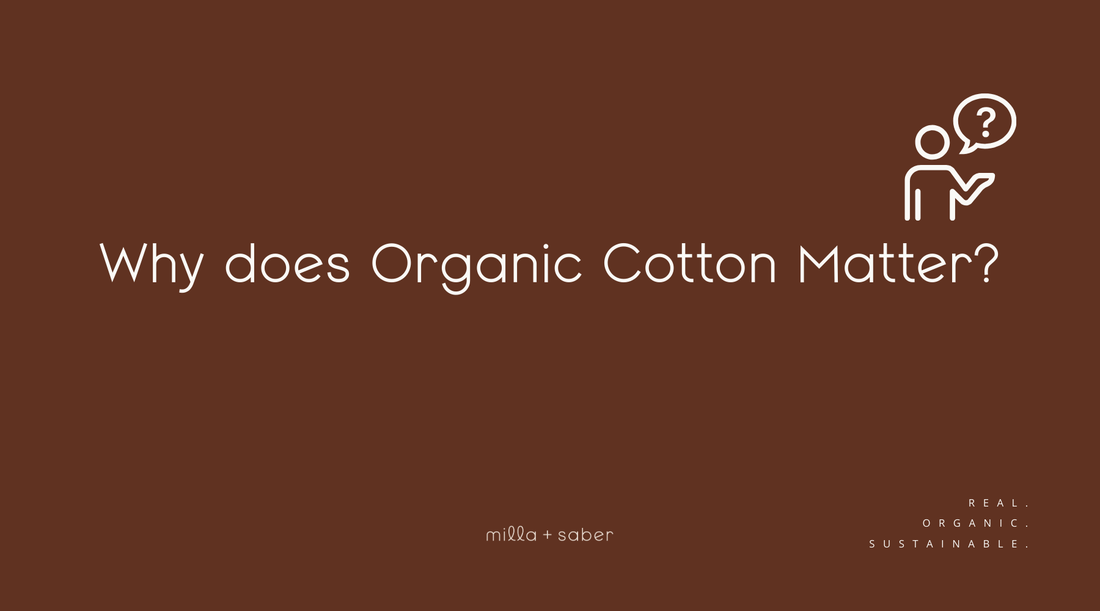
Why Does Organic Cotton Matter? | Sustainable, Gentle, and Ethical
Understanding Organic Cotton: Why It Matters
Organic Cotton is a thoughtful choice - one that supports the environment, protects your health, and values the people behind the product. Unlike conventional cotton, which is often called the world’s dirtiest crop due to its heavy reliance on synthetic chemicals, Organic Cotton is grown with natural, mindful methods that prioritise sustainability and wellbeing.
The Problems with Conventional Cotton
Conventional cotton farming has a significant environmental cost. It accounts for a large portion of the world’s pesticide use - with over $3 billion worth of toxic chemicals used on crops every year. These substances contaminate water, damage ecosystems, and put farmers and communities at risk. Pesticide exposure leads to serious health problems, and globally, pesticide poisoning causes around 200,000 deaths annually.
The impact doesn’t end there. Conventional cotton is incredibly water-intensive. Producing just one t-shirt can use up to 2,700 litres of water, much of which is wasted or polluted through chemical runoff.
Why Organic Cotton Is the Better Option
Organic Cotton offers a cleaner, more conscious alternative. It’s grown without synthetic pesticides, toxic dyes, or genetically modified seeds. Instead, it’s cultivated using methods that support the earth, protect workers, and care for your skin. Here’s how:
-
Grown Without Harmful Chemicals
Organic farms use natural pest control techniques, like beneficial insects and crop rotation. This reduces pollution, keeps waterways clean, and supports healthy biodiversity. -
Water-Wise Farming
Organic Cotton typically uses up to 91% less water than conventional cotton. Many farms rely on rainwater and maintain soil health to retain moisture naturally, reducing the burden on local water sources. -
Healthier Soil
Organic farming improves soil structure using compost, cover crops, and no synthetic fertilisers. Healthy soil stores more carbon and helps reduce climate impact. -
Ethical Production Standards
Global certifications like GOTS (Global Organic Textile Standard) ensure that workers are treated fairly with safe conditions, fair wages, and no child labour. -
Safer for Sensitive Skin
Organic Cotton is free from harsh chemical residues, making it a gentler choice for babies, children, and anyone with sensitive skin or allergies.
Why It Matters for Parents
When you’re dressing your baby, you want the best - soft fabrics, breathable materials, and nothing harmful touching their skin. Organic Cotton baby clothing is a reassuring choice. It’s free from irritants, luxuriously soft, and made with care from seed to stitch.
Beyond Clothing
Organic Cotton isn't just for clothes. It’s a sustainable material choice for reusable tote bags, accessories, bedding, and more. It’s durable, washable, and kind to the earth - a perfect blend of practicality and purpose. For brands, it also sends a strong message: we care about what we’re making, and how we’re making it.
Caring for Organic Cotton
To extend the life of your Organic Cotton pieces:
-
Wash in cold water using a gentle, eco-friendly detergent
-
Skip the dryer when you can and air dry instead
-
Mend small tears to reduce waste and preserve your favourites
These simple steps help your garments last longer and reduce your footprint even more.
A Conscious Choice
Organic Cotton isn’t just a fabric - it reflects your values. Choosing it means supporting cleaner air and water, safer workplaces, and healthier homes. It’s about feeling good in what you wear and knowing it’s made with intention.
Whether you’re shopping for your little one or making choices for your brand, switching to Organic Cotton is a small act with a big impact.
You can browse our range of delicate skin babywear and accessories here or reach out with any questions via our Contact Us page.
Lauren xx
Milla + Saber
